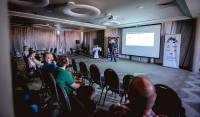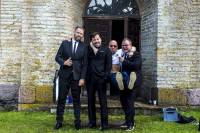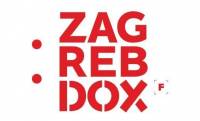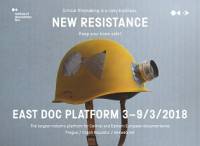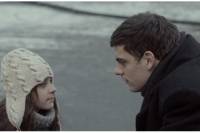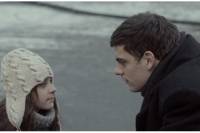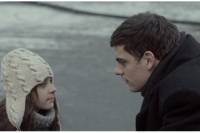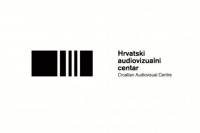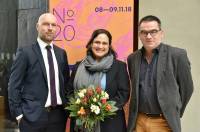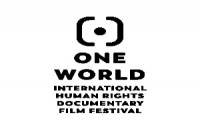Now running into its second year, the European Genre Forum has selected eight exciting projects to take part in the 2018 training cycle, starting on April 16th, 2018.
The 2018 project selection spreads geographically well over Europe, reaching as far as Israel. The stories reflect a wide variety of fantastic cinema, amongst them tales of witchcraft, nightmarish relationships, supernatural stories, plagues and mountain trips gone wrong… We are very please to officially announce the list of the 2018 EGF selected projects.
The Selected Projects
BIRDS OF A FEATHER - Dir. Hanna Bergholm (Finland)
FINGERNAIL - Dir. Boaz Armoni (Israel)
NO MAN’S LAND - Dir. Mel Piper (Germany)
SPINNERS - Dir. Ivars Tontegode (Latvia)
THE BASE - Dir. Alex Madia Levi (United Kingdom)
THE DESCENDANT - Dir. Colinda Bongers (The Netherlands)
THE HIKE - Dir. Daniel Rübesam (Germany)
THE PLAGUE DOCTOR - Dir. Michael O’Connor (Germany)
| Click here for more information about the projects |
The selected projects will have the opportunity to attend three talent labs over the course of the year 2018. The Director’s Lab takes place in Amsterdam during the Imagine Film Festival, from 16 to 20 April 2018. The Producer’s Lab takes place in Zagreb during Fantastic Zagreb, from 4 to 8 July 2018. The Packaging Lab takes place in Tallinn during PÖFF, in the final week of November 2018.
The training cycle aims to not only boost the selected film projects, but to also give an invaluable knowledge to the participants, offer new insights and to facilitate professional networking. During the three talent labs, participants will be able to discuss their project with script consultants, learn about the different aspects of (co-) production, sales and packaging from Industry professionals. Mentoring sessions with established genre filmmakers, crowd funders, legal experts, VR and AR experts, and case studies of recent, successful films complete the programme.
About the European Genre Forum
The European Genre Forum (EGF) is an educational event jointly organized by Fantastic Zagreb, Imagine Film Festival (Amsterdam), Black Nights FF and its Industry platform Industry@Tallinn&; Baltic Event (Tallinn) and Screen Division (Paris). The programme is supported by the Creative Europe – MEDIA programme of the European Union.
Project Coordinator
Annick Mahnert This email address is being protected from spambots. You need JavaScript enabled to view it..
TALLINN: Class Reunion 2, the sequel to the remake slapstick comedy Class Reunion / Klassikokkutulek directed by Rene Vilbre, broke the all-time opening record in Estonia. The film produced by Taska Film is now among the four Estonian films with 500,000 EUR gross.
Zagreb, 25 February 2018 – The 14th edition of ZagrebDox International Documentary Film Festival opened tonight in five theatres at Kaptol Boutique Cinema. In the upcoming seven days, festival visitors will be able to enjoy a total of 125 films covering a broad spectrum of topics and taking us to all the four corners of the world. The festival opened with the film Over the Limit by Polish director and festival guest Marta Prus, and the audience was greeted by the festival director Nenad Puhovski and mayor of Zagreb Milan Bandić, who also officially opened the festival.
In his speech Nenad Puhovski pointed out that ZagrebDox is a festival promoting and celebrating diversity, primarily the creative diversity of authorial aesthetics, as well as the diversity of people before the camera. Whenever I am asked if ZagrebDox has a special theme on a particular year, my answer is always – yes, 120 of them. ZagrebDox is a festival starting from the point that we are all different, special and belonging to a minority group which should be protected – not only racial, national, gender or economic, not only groups special attention should be paid to, such as persons with disabilities, children war victims, rejected workers or domestic violence victims, but also minorities such as the left-handed, people with feet of different sizes or (like m) men who don’t drink alcohol and aren’t into football, said the director of ZagrebDox and added we are heading for a week full of films which will hopefully inspire more respect to diversities, which our society lacks. He concluded his speech with a thanks to all the partners, sponsors and media coverage providers. A special thanks to our golden sponsor Addiko Bank and our general sponsor Croatian Telecom, as well as the City of Zagreb and Croatian Audiovisual Centre for their support. Big thanks to our volunteers and the outstanding festival team, led by the main producer Lucija Parać, said Nenad Puhovski in conclusion.
Milan Bandić wished everyone a warm welcome to the 14th ZagrebDox, describing it as a festival of great importance for Zagreb and our film community. This festival has for years been contributing to the image of Zagreb as a cultural and travel destination, but apart from international visibility even more important is the job it does in our society, the awareness of the world we live in and the motivation to change it. Besides, its official sections develop new generations of documentary filmmakers to carry the torch of conveying the cruel but beautiful reality, said mayor Bandić and added that the City of Zagreb has been supporting this festival from the beginning as a remarkable showcase of Croatian and Zagreb culture. As a mayor I can say I am very proud of ZagrebDox and once again I extend my congratulations to the festival team on these 14 years and wish them an even more successful future. May our citizens have a best of times enjoying the films in the programme, said Bandić in conclusion and with these words officially opened the festival.
After the screening of Over the Limit, the audience was greeted by the film’s director Marta Prus, thanking the organisers for opening this year’s ZagrebDox with her film. She pointed out that she put her whole heart and soul into the making of this film, deciding to speak up about the demanding world of professional sport partly because she was also oce a rhythmic gymnast.
The 14th ZagrebDox festival closes on Sunday, 4 March and during the seven festival days it will be screening from 11am to 10pm.
MEDIA CONTACTS
Ivana Sansević E: This email address is being protected from spambots. You need JavaScript enabled to view it., M: 091 528 7605
Iris Mošnja E: This email address is being protected from spambots. You need JavaScript enabled to view it., M: 098 9309 609
www.zagrebdox.net
The EAST DOC PLATFORM, the largest event for documentary professionals in Central and Eastern Europe, takes place March 3-9, 2018. During the week-long event, Prague will host leading documentary professionals, distributors, TV and festival selectors from around the world. Filmmakers will pitch their documentary projects and compete for several prizes in the total amount of EUR 35,000. General audiences can attend a number of interesting talks by international professionals. Most events take place at the Cervantes Institute, entrance to talks is free.
The theme of the 7th EDP “New Resistance” addresses the rise of nationalism in the region of Central and Eastern Europe. “We hear more and more political voices today calling for the restriction of critical free press. Public media and free speech have come under attack, documentary filmmakers and journalists have been facing threats of censorship even in the Czech Republic. Countries in the former Eastern bloc share a common history with regard to these issues. It is time to reopen the subject and find some lessons for the present,” explains Tereza Šimíková, EDP Manager. What impact do these tendencies have on the life of documentary filmmakers? Is their stubborn unwillingness to turn a blind eye to current issues more important today than ever before? Get answers to these and other questions at a panel discussion with the invited guests: Max Tuula (The Trial: The State of Russia vs Oleg Sentsov), Filip Remunda (Czech Journal), Konrad Szołajski (The Battle with Satan) or Outriders, a platform for independent Polish journalism. The discussion will be hosted by Czech journalist Veronika Sedláčková and it will be translated into Czech. It takes place on Tuesday, March 6 at 4 p.m., Kino 35, French Institute in Prague.
This year’s EDP has a slate of inspiring talks for visitors. On Wednesday, March 7 at 5 p.m., we are proud to introduce Kim Longinotto, one of the most popular documentary filmmakers whose previous films include the Cannes IFF winner Sisters in Law and Rough Aunties, awarded at Sundance. Liz Rosenthal, a curator of the world’s first festival VR competition that takes place as part of the Venice Biennale, will deliver a talk entitled “How to Bring VR Projects to Life”. It takes place on Monday, March 5 at 6 p.m., Cervantes Institute.
Another attractive panel discussion will be dedicated to new funding opportunities. The traditional model of international collaboration with TV networks is in troubles due to cuts in co-production funding, and so the East Doc Platform has decided to invite an entirely new type of partners – international fund representatives and investors connecting film and private equity. For the first time in Prague, we have the pleasure of hosting representatives of Chicken & Egg Pictures, a US fund that supports women nonfiction filmmakers, Whicker’s World Foundation and the Tribeca Film Institute that in partnership with the EDP organizes a brand new short film pitch competition this year. The panel discussion takes place on Wednesday, March 7, at 3 p.m.
Filmmakers who will pitch their documentary projects at the East Doc Platform will compete for one of several awards designed to aid further film development. Czech audiences will surely appreciate the fact that nearly one in three selected projects has a Czech director or (co-)producer. These and other projects will be carefully assessed by international festival selectors, including Martijn te Pas, Senior programmer at IDFA, who will be looking to find the best films in the region and set them on a successful path. An international jury consisting of Serge Gordey, Esther van Messel, Rada Šešić, Lejla Dedić and Lars Säfstrom will present the best project in development and production with the East Doc Platform Award that comes with EUR 7,500. Czech TV, EDP’s general media partner, will announce the Czech TV Co-production Award that comes with EUR 5,700. The best short project will receive USD 20,000, year-long mentoring service and distribution support from the Tribeca Film Institute. In addition, all projects selected for the 2018 East Doc Platform will compete for the HBO Europe Award and EUR 2,000 for project development. Current Time TV will support a selected filmmaker with EUR 1,500.
East Doc Platform will also hold the official opening of the fourth edition of the project KineDok, focused on alternative distribution of creative documentaries. It will start fashionably with a screening of Polish film Communion (Anna Zamecka, 2017), awarded the best European Documentary Award. The screening will be followed by Q&A with filmmakers and party.
The East Doc Platform is organized by the Institute of Documentary Film in partnership with the One World International Human Rights Documentary Film Festival.
About the Institute of Documentary Film
The Institute of Documentary Film (IDF) has been supporting creative documentary films from Central and Eastern Europe since 2001. IDF provides both emerging and experienced filmmakers with training, financing, networking and pitching opportunities, helps them get international attention and co-productions, rewards the exceptional projects with Awards and further opportunities and improves their orientation on the international market. To the audience of documentary enthusiasts, IDF also brings a rich programme of lectures, presentations and screenings in their home regions or during IDF’s industry events.
About the East Doc Platform
The East Doc Platform (EDP) is the largest co-production, funding and distribution platform tailor-made for Central and East European documentaries. Every year, connecting 120 East European filmmakers to more than 100 key decision makers - producers, broadcasters, distributors and festival programmers from around the world.
More details on selected projects here: https://dokweb.net/articles/detail/458/best-documentary-projects-selected-for-east-doc-platform-2018
More details on invited guests and programme highlights here: https://dokweb.net/articles/detail/466/east-doc-platform-2018-meeting-point-with-interesting-guests
For more information, please visit dokweb.net
Contact for international media
Marta Jallageas / This email address is being protected from spambots. You need JavaScript enabled to view it. / Tel : +420 775 669 222
BELGRADE: Alexey German Jr.’s Russian/Polish/Serbian coproduction Dovlatov, which was awarded the Silver Bear for Outstanding Artistic Contribution at the 2018 Berlinale, was sold by Alpha Violet to Netflix for English-speaking territories and to several other territories.
FESTIVALS: Silver Bear and Berliner Morgenpost Readers Award for “Dovlatov” Polish Coproduction of Message Film with Cinematography by Lukasz Zal
Region 26-02-2018BERLIN: The film had been already sold to 23 countries, Netflix is among the distributors.
Silver Bear and Berliner Morgenpost Readers Award for “Dovlatov” Polish Coproduction of Message Film with Cinematography by Lukasz Zal
Festivals 26-02-2018The film had been already sold to 23 countries, Netflix is among the distributors.
Stipan Tadić is the author of this year's World Festival of Animated Film - Animafest Zagreb festival illustration
Press releases 21-02-2018The author of this year's World Festival of Animated Film - Animafest Zagreb illustration is Stipan Tadić. Tadić is one of the most prominent Croatian painters of the younger generation, has participated in numerous group and solo exhibitions all over the world and is a winner of several awards. His unusual approach in creating the visuals won over the artistic director Daniel Šuljić and the rest of the Festival Council who had unanimously decided that Stipan will be the author of the poster and the trailer for Animafest Zagreb 2018.
FIND MORE INFORMATION HERE
The new director of connecting cottbus, Marjorie Bendeck, introduced herself at the traditional East European Brunch in the State Representation of Brandenburg at the Federal Government during the 68th Berlinale. The East West co-production market celebrates its 20thanniversary this year and will take place on Nov 8th and 9th, 2018 during the 28th Cottbus Film Festival (Nov 6th-11th, 2018).
Marjorie Bendeck has been appointed new director of connecting cottbus, taking over the artistic direction of the co-production market: "Eastern Europe is quite a fascinating region, with a unique convergence between history, politics and arts, home to many talented filmmakers. I look forward to working more intensively with them."
Originally from Honduras, based in Germany since 2003, Bendeck has an international standing from working with various funds, industry and training events as a selection, development and pitch consultant; she has worked with the pitching participants of coco since 2013.
"We sincerely thank Rebekka Garrido. Over the past three years, she has played a decisive role in boosting and reshaping the profile of the connecting cottbus co-production market with her commitment", says Andreas Stein, Managing Director of coco organizer pool production.
As the first official act of the new connecting cottbus director, Bendeck presented the Special Pitch Award to Polish director-screenwriter Anna Jadowska. This prize enables Jadowska to pitch her new project at the 20th connecting cottbus co-production market. Jadowska won four prizes at the 27th FilmFestival Cottbus with her film WILD ROSES (Main Prize for Best Film, Award for Outstanding Actress for Marta Nieradkiewicz, FIPRESCI Prize, Prize of the Ecumenical Jury).
Bendeck also gave an outlook on the 20th edition of coco: “Besides the usual public pitch of our selected projects, we will continue with the work in progress section introduced last year, which was well received. We will organize case studies around outstanding completed projects which were pitched in previous coco editions. We are also planning a spotlight on Georgia, sharing the focus of the Film Festival Cottbus.”
Human rights in cyberspace and in distant parts of the world. This year, One World will show 128 films and has invited 120 international guests
Festivals 20-02-2018
An ever larger part of our lives takes place in virtual space, and so the question of human rights increasingly touches on cyberspace as well. What are our rights to privacy, how much does our online data say about us, how can it be misused for human rights violations, and what challenges does the spread of social networks bring to our real, offline lives? All these subjects are explored by the opening film of this year’s One World film festival, The Cleaners, which looks at the work of content moderators on social networks. Nameless people in nameless buildings in the Philippine capital of Manila decide about what we see on our Facebook wall. The film will be personally introduced by director Moritz Riesewieck. But One World looks beyond cyberspace – this year’s festival offers a look at human rights issues from many different, often surprising, angles and presents films from 52 countries from around the world.
This year for the second time, an international jury will choose the best documentary in the Czech Competition category, in which ten Czech productions films will vie for the main prize. World premieres in this section include director Saša Dlouhý’s God Forsaken about the life of immigrants in the Czech Republic, Andran Ambramjan’s Empire builders, which presents a staged show by local anti-Islam extremists, and AsexuaLOVE, which is the first film to explore our country’s asexual subculture. Another three films will be presented as Czech premieres: Nothing like before by the directorial duo of Lukáš Kokeš and Klára Tasovská is a contemporary coming-of-age story set in a small town on the country’s borders, When the War Comes (dir. Jan Gebert) looks at the controversial extremist group Slovak Fighters, and Petr Horký’s The Russian Job explores the fate of the Russian carmaker AvtoVAZ and the legendary Lada cars.
Two other competition categories are International Competition and Right To Know. The first presents documentaries characterized by a unique and original style, and these will compete for the prize of best film. One World will present the documentary I know you are there (dir. Thom Vander Beken), which follows the story of Quentin, who woke up in the state of minimum consciousness after a car accident and his family, who has been taking care of him for ten years. The documentary Of Fathers and Sons by successful filmmaker Talal Derki deals with war theme and portrays Islamic radicalization of children, encouraged by their closest family.
In the category Right To Know, twelve films will be vying for the attention of the Václav Havel Jury. The participating films reveal serious human rights violations or present strong stories of people actively fighting for human rights. Director Barbet Schroeder’s The Venerable W. looks at the discrimination and repression of the Rohingya ethnic minority in predominantly Buddhist Myanmar, and specifically at the Buddhist monk Wirath who promotes ethnic violence despite the peaceful principles of his religion. Another director to come to Prague is Margarita Cadenas, the creator of Women of the Venezuelan Chaos, which explores one of the worst crisis in the history of Venezuela through the personal stories of five women of various generations. The documentary A Woman Captured by Hungarian director Bernadett Tuza-Ritter reveals a case of domestic slavery that still exists in Eastern Europe today through the story of its main character Maris.
One new addition to the festival this year is the section Americana, which takes a look at the current state of the USA. It has been a year since the election of Donald Trump, and his path to the White House is captured in Trumped by the directing trio of Ted Bourne, Mary Robertson, and Banks Tarver. Another burning issue, the status of African Americans, is the subject of Whose Streets? (dir. Sabaah Folayan) and For Ahkeem (dir. Jeremy S. Levine). And the country’s past injustices against its original inhabitants are explored in Jeremy Williams’s On a Knife Edge.
Another category, Eurodrome, looks at the challenges that Europe has had to face in the past few years: mass migration, growing populist movements, and the economic crisis. One country to have faced growing nationalism in recent years is Greece, where the extremist Golden Dawn party took third place in elections. Golden Dawn Girls (dir. Håvard Bustnes) shows us the daughters, mothers, and wives who try to keep this movement afloat while its leaders spend four years in prison. The recent terrorist attacks have affected not only native Europeans but also those who came to Europe in search of a safe haven. One such person is Zineb El Rhazoui, the subject of Nothing is Forgiven, who must come to terms with the assassination of her colleagues from the satirical magazine Charlie Hebdo. Both El Rhazoui and director Vincent Coen will accompany the film to Prague.
The unifying theme of the documentaries in the category Beyond the Horizon is distance – between continents and people, and from ourselves. The participating films look at place beyond our physical as well as mental horizons. The diversity of distant shores is represented by three coming-of-age stories from the Far East: Becoming Who I Was (dir. Moon Chang-yong, Jeon Jin) from northern India, The Next Guardian (dir. Arun Bhattarai, Dorottya Zurbó) from Bhutan, and Almost Heaven (dir. Carol Salter), an unusual, sensitive portrait of a girl working in a Chinese funeral home.
The subjects of the films in the category of Art For Change use music, film, or poetry to try to effect change on the personal or societal level. The focus of the Silvana (dir. Olivia Kastebring, Mika Gustafson, Christina Tsiobanelis) is a young Swedish woman with Syrian-Lithuanian roots who uses rap music to express her views on racism and xenophobia and to promote LGBT and women’s rights. When God Sleeps (dir. Till Schauder) follows the Iranian musician Shahin Najafij, who was subjected to a fatwah for criticizing religious fanaticism and censorship in his home country. Women’s equality in Saudi Arabia is still in its infancy, but Hissa Hilal has succeed in breaking this taboo. She is the first woman to reach the final round of the popular television contest Million’s Poet, and her life is the subject of The Poetess. All three subjects have accepted our invitation to attend our festival.
The documentaries in the category of Journeys To Freedom look at countries in which the nonprofit organization People in Need is active or that have long been the subject of their attention. Director Feras Fayyad’s Last Men in Aleppo, which has been nominated for an Academy Award for Best Documentary, shows the impact of the war in Syria. A Cambodian Spring (dir. Christopher Kelly) spent six years following people’s protests against the confiscation of the land on which they live.
The internet, social networks, and other digital worlds have become a new reality in which users change – or, conversely – fortify their identity. The category One Zero looks at stories of people who have become entangled in the digital web. After filming her portrait of Edward Snowden, Oscar-winning director Laura Poitras looks at the founder of WikiLeaks Julian Assange in her new film Risk. Germany’s Pre-Crime (dir. Matthias Heeder, Monika Hilscher) shows how big data can be used to predict possible future crimes.
The subjects of the films in Long Live Life! break down ingrained stereotypes to show that even in today’s stressful and fast-pasted world, you can follow your own path and enjoy life on your own terms. One unusual form of entertainment is riding wooden horses, which is a popular pastime among Scandinavian teenagers. This unusual hobby is the subject of director Selma Vilhunen’s Hobbyhorse Revolution. Meanwhile, the protagonists of Ultra push their physical abilities to the limits as they prepare for the Spartathlon – a 246-kilometer-long race that the film’s director Balázs Simonyi participated in as well.
Environmental issues are the subject of the films in the category UnEarthed. Humankind has still not managed to slow the worsening state of the environment. Guardians of the Earth (dir. Filip Antoni Malinovski) returns to the year 2015 to capture the atmosphere and the actions of politicians at the Paris climate conference, which is one of the most important such conferences in history. War reporter Kate Brooks’s The Last Animals looks at the problem of animal poaching, which every year kills thousands of elephants and rhinoceroses. Her film even took her to the Zoo in Dvůr Králové.
In the traditional category Panorama, the festival presents documentaries that have been successes at important foreign festivals. The film Better Man (dir. Attiya Khan, Lawrence Jackman) focuses on the topic of domestic violence. The camera follows the meeting of Attiya and Steve, who - after twenty years - decided to talk about the reasons of their breakdown. In Deaf Child, director Alex de Ronde shows the childhood and adolescence of his deaf son Tobias and his struggle for the respect for the hearing impaired.
News and interesting facts for the 20th anniversary festival
Talking Cinema
The festival cinemas will do more than just screen films. Another new addition this year is Talking Cinema, which will present six public discussions on selected films related to current issues that resonate throughout society. The discussions will be in English, with simultaneous translation into Czech. Three of the discussions will be translated into sign language. The topics of debate will be predictive crime-fighting, the contemporary state of politics in the USA, populism in Europe, and the power of disinformation. The invited guests include journalist David Patrikarakos (author of the book War in 140 Characters) and Polish activist and founder of the Cziarny Protest movements Marta Lempart. The film The Venerable W will feature a special guest, the internationally renowned Burmese political activist Wai Wai Nu, who will give a solo talk.
The co-organizer of the Talking Cinema programme is the Goethe-Institut Prague.
Virtual reality
This year for the third time, One World Interactive invites viewers into a virtual environment containing documentaries about real people and events. This year will be the first time that audiences can see the films at the same time and in the same place as other viewers in a special VR cinema. This section presents three thematic sub-categories: the films about the environment (A Journey to the Arctic , Planet, Under the Canopy) look at the disappearing Amazon rainforest or the slowly melting glaciers of the Arctic, documentaries about the migrant crisis (Sea Prayer, Limbo, Life in the Time of Refuge) let audiences feel what it is like to have left one’s home country. Bloodless (Korea), Francis (Ghana), and Collisions (Australia) take viewers on a journey to distant places on our planet.
The partner of the VR programme is Alza company.
Retrospective: Kim Longinotto
“Sometimes you don’t even have to understand what your subjects are saying. It’s enough to truly listen to them,” says British director Kim Longinotto, who often films herself in countries where you will not get by on English alone. In her observational documentaries, she focuses almost exclusively on stories of strong women who refuse to be told what they should do. Her films have appeared at One World since the festival’s founding, and on our 20th anniversary we will be screening three of them – Dreamcatcher, Pink Saris, and Sisters in Law.
Films that change the world
Some documentaries aim for more than just audience applause and a full house. This year’s festival is showing 23 films whose goal is to affect real social change: Some of the filmmakers have launched their own campaigns that the public can join, and for other films the organizers of One World have prepared special accompanying events. You might think that the pollution of the ocean does not really affect us in the Czech Republic. Watching Blue is guaranteed to change your mind. The oceans are full of plastics and trash, and the ecosystem affects global warming. Both have negative impacts on underwater life. Each and everyone of us can contribute to change – specific tips along with the inspirational stories of the Ocean Guardian community can be found on the film's website.The fight for equal opportunity for men and women is depicted in various ways in many films in this year's festival. The Film A Theory of Equality presents several Czech initiatives for gender equality. One of them is the organization Genderman, that offers a possibility to compare life experiences from the point of view of gender. Workshop with the Genderman organisation will – among other things – deal with the campaign "#metoo" and its impact the Czech Republic.
One World for All
This is the second year of One World for All, which aims to make screenings accessible to the largest possible number of people regardless of age, handicap, or native language. As part of this effort, we will be showing ten films with subtitles for the hearing-impaired (City of Ghosts, Golden Dawn Girls, A Woman Captured, Deaf Child, Stranger in Paradise, The Cleaners, Becoming Who I Was, Blue, Nothing Like Before, The Limits of Work), plus four films with audio commentary (The Limits of Work, Non-Parent, Mečiar, and Czech Journal: A Theory of Equality). A new addition this year are “relaxed” screenings, which are intended for viewers with mental handicaps and difficulties concentrating, but also for anyone seeking to simply relax during the screening. During these screenings, the lighting and audio are subdued, and the films are shown without trailers or advertisements. There will be six relaxed screenings: The Limits of Work, Czech Journal: A Theory of Equality and (as a set of three shorts) Rozárka and Homeless Cooks, Girl Against Gravity and Lenno & the Angelfish.
East Doc Platform 2018: Critical documentary film has become a risky undertaking
Running concurrently with the One World festival is the East Doc Platform (EDP), the largest event for documentary filmmakers in Central and Eastern Europe. Over the course of a week, Prague will host a gathering of top film professionals, with a wide range of interesting public lectures by leading experts. The subject of the seventh annual EDP, “The New Dissent,” looks at the current political situation, at attempts at limiting documentary freedom, and at critical voices in the media. What influence do these trends have on the life and work of documentary filmmakers? These and other questions will be addressed by a panel discussion at 4pm on Tuesday 6 March at the French Institute’s Kino 35. East Doc Platform will cover a wide range of subjects, including important issues for filmmakers such as financing distribution, which in recent years have undergone dramatic changes. The panel discussion on this subject will feature representatives from the prestigious American film funds Chicken & Egg Pictures and the Tribeca Film Institute, who will join other investors that bring together film and the private sector in order to discuss new ways of financing. Another lecture sure to be interesting is the talk by one of the world’s most successful creators of film trailers, Fraser Bensted, who created the trailers for popular films such as Slumdog Millionaire or Billy Elliot. New innovations in interactive work will be presented by Liz Rosenthal, curator of the world’s first festival competition in the area of virtual reality, held during the Venice Biennale. For more on the East Doc program, visit dokweb.net. The event is organized by the Institute of Documentary Film.
Screenings for schools
As in the past, One World offers matinee screenings for primary and secondary schools from throughout the country. For children aged 8 to 14, we are preparing a series of short films; for older students, we will have selected medium-length films from the One World festival program. The screenings are followed by discussions during which young viewers can learn more about the subject of the film and are given the chance to express their own views. Also this year, we are organizing family screenings at which we will show six films through which children can learn about the life of their peers throughout the world.
One World in numbers
- this year’s program presents 128 films from 52 countries in 15 categories
- 20 premieres (5 world, 12, international, 3 European)
- this year festival will visit 38 cities (5–14 March Prague, followed by regional towns and cities and Brussels)
- more than 120 confirmed festival guests
- as part of One World for All, we will show 10 films for the hearing impaired and 4 films with audio commentary
- we will screen 6 films for families
- 119498 people visited One World in 2017
Practical information
- Ticket sales in Prague start on Monday, 26 February. Tickets are CZK 60 for starting at 5pm or earlier; evening screenings are for CZK 100. Tickets to the VR cinema as part of One World Interactive programme cost CZK 60. There will be a children’s play corner at the Audience Center in the Tibet Open House (Školská 28, Prague).
- ZTP cardholders and ZTP/P cardholders have reduced entry fees for all projections by 50%.
- The assistents of ZTP/P cardholders have free entry.
- To book reservations for ZTP and ZTP/P holders and to get additional infromation (barrier-free, seniors, interpreting to Czech sign language, audio commentary) please contact This email address is being protected from spambots. You need JavaScript enabled to view it. or +420 777 787 925.
- The number is reserved only for information on the accessibility of the festival. It does not serve as a number for regular screening reservations.
The press center, where we will be issuing press accreditation during the festival, can be found at the People in Need Center in the Langhans Buildings (Vodičkova 37, Prague), which is open from 5 to 14 March from 10am to 6pm.
A complete program and festival visuals are available at www.oneworld.cz
A list of guests is attached. Photographs and access to films are provided upon request.
To arrange interviews with festival guests, please contact our media coordinator:
Gabriela Gálová – media coordinator
mobile: + 420 777 787 962
This email address is being protected from spambots. You need JavaScript enabled to view it.
Organizer:
People In Need
Co-organizer:
Ministry of Culture of the Czech Republic
Support:
State Cinematography Fund
The City of Prague
Creative Europe – Media programme
Avast Foundation
Zátiší group
Knihy Dobrovský
General media partner:
Czech Television
Main media partner:
Czech Radio
Special thanks:
Tibet Open House

